Introduction: In this article, Melissa Davenport Berry continues her story about out-of-wedlock births in some of the earliest colonial settlements in America. Melissa is a genealogist who has a blog, AnceStory Archives, and a Facebook group, New England Family Genealogy and History.
Today I continue with the paternity dramas of Joseph Quinby (1684-1745) of Amesbury, Massachusetts, and focus on some of his descendants.
To recap: Quinby fathered two illegitimate daughters in 1712: one with Lydia Hoyt, whom he would later marry; and another with Rachel Morrill.
In 1715, still single, Quinby fathered two more tots (twin boys) with Rachel Morrill. For full details, see: Paternity Drama in Colonial America (part 1).
Court records reveal Quinby made custody payments to Rachel until 1722.
The twin Quinby boys – Benjamin and Joseph – married, prospered, and settled in Maine leaving many descendants.
Benjamin Quinby (1715-1807) married Anne Plummer, daughter of Nathan Plummer and Barbara Davis. More on their family in a future article.
Joseph Quinby (1715-1776) married Mary Haskell, daughter of Thomas Haskell and Mary Parsons. He was a shipbuilder and owned a substantial amount of land.
The Quinby Family, Account Books, 1743-1805 are housed at the American Antiquarian Society in Boston.
Among the account ledgers in the collection is Joseph’s son Captain John Quinby (1758-1806), also a ship builder. He married Eunice Freeman, daughter of Joshua Freeman and Lois Pearson.
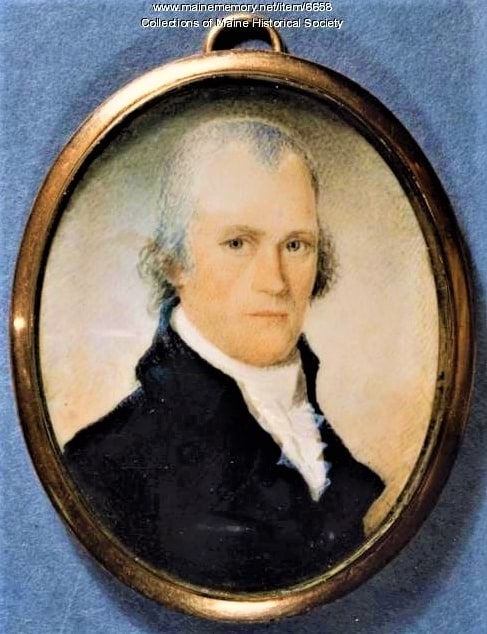
Eunice was a descendant of Governor Thomas Dudley, Captain John Appleton, Rev. Dr. John Rogers, William Cottle, John Pearson, and Jose Glover, as well as Mayflower passenger Elder William Brewster through his daughter Patience Brewster, who married Governor Thomas Prence.
And not to confuse matters, but the first few generations of the Amesbury, Salisbury, and Newbury lines that fathered the parents of the Quinby babes born from the paternity cases intermarried, so the Quinby marriages into the Titcomb family below are related and are double cousins. This is explained in the Quinby Genealogy.
Children born to John Quinby and Eunice Freeman:
- Eunice Quinby married Ezekiel Day
- Thomas Quinby died without issue
- Moses Quinby married Anne Titcomb, daughter of Andrew Philip Titcomb and Mary Dole
- Levi Quinby married Mary Titcomb, sister to the above Anne Titcomb
- George Quinby drowned at age 1
- An infant son died along with Eunice during childbirth. Below is her obituary notice from the Cumberland Gazette.

It read:
Last Lord’s day departed this life Mrs. Eunice Quinby, the amiable consort of Mr. John Quinby of Falmouth, in the 28th year of her age.
Captain Quinby’s business included building and fitting out ships – and he owned quite a few. In addition, he had a shop in connection with this enterprise. Two of his ships were captured by the French in the late 1790s.
One was named Eunice for his wife and daughter. I found a report of the ship’s capture in the Springer’s Weekly Oracle, reported via a letter written by Captain Thomas Seal, a protégé and trusted agent of Capt. Quinby and the master of the Eunice.
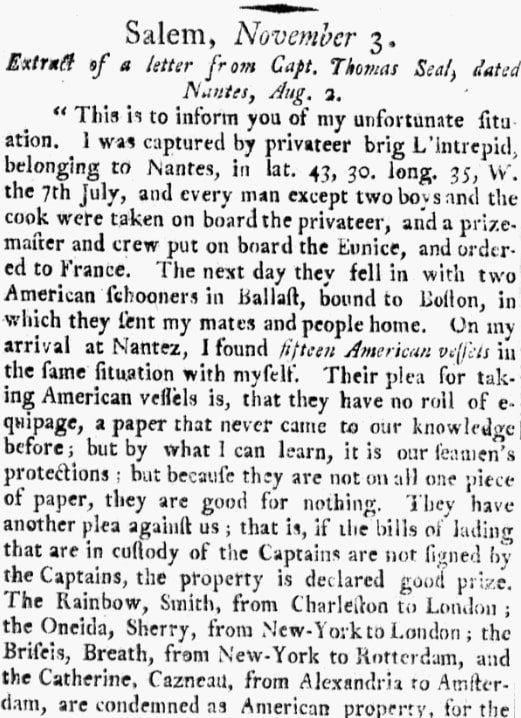
This article reported:
This is to inform you of my unfortunate situation. I was captured by privateer brig L’Intrepid, belonging to Nantes, in lat. 43, 30. long. 35, W. the 7th July, and every man except two boys and the cook were taken on board the privateer, and a prize-master and crew put on board the Eunice, and ordered to France. The next day they fell in with two American schooners in Ballast, bound to Boston, in which they sent my mates and people home. On my arrival at Nantes, I found fifteen American vessels in the same situation with myself.
Capt. Seal expressed his frustration in making a full inventory of the captured ship’s cargo and accounting for all its passengers. The recovery was a tricky one for Capt. Quinby. There were two court dates, but neither went in his favor.
Because John Quinby was the sole owner of the ship, he had no insurance on it. This made it difficult for the legal claim. However, Capt. Quinby presented papers to substantiate his clam and filed them with the Department of State on 7 March 1799.
The United States received a settlement from the French via a treaty of 30 September 1800 for all French spoilation, but Congress did not pay out immediately.
Capt. Quinby left his “French claim” by will to his sons Moses and Levi. They died in due course and their sons and daughters likewise, with the claim still not being settled.
The payment was finally issued by Congress after a court hearing in 1900 for $11, 938 (that is equivalent to $427,550 today). This circumstance was not an uncommon situation for many ship owners and their descendants.
In 1805, shortly before Capt. Quinby passed, a very special celebration occurred. His daughter Eunice presented a flag to the “Stroudwater Light Company,” one of Portland’s private militias.
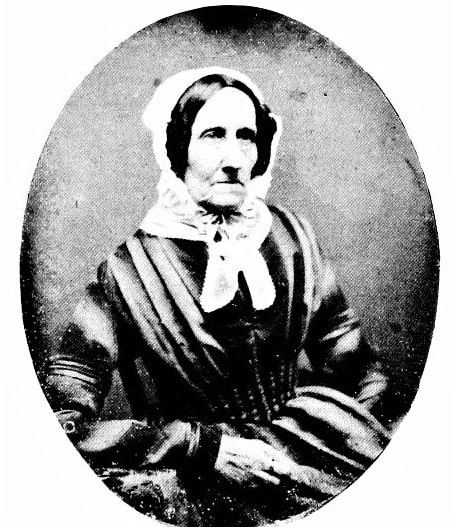
The Kennebunk Gazette reported the event, which was organized by Maj. Stephen Webster.
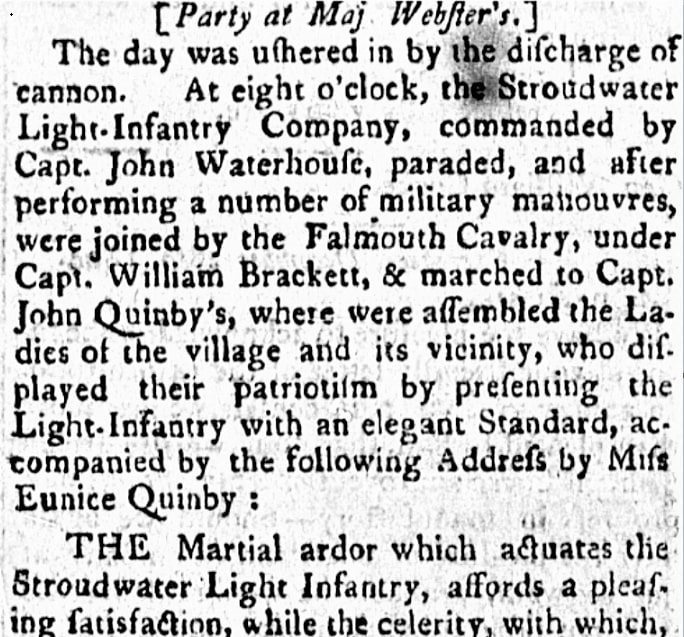
This article reported:
The day was ushered in by the discharge of cannon. At eight o’clock, the Stroudwater Light-Infantry Company, commanded by Capt. John Waterhouse, paraded, and after performing a number of military maneuvers, were joined by the Falmouth Calvary, under Captain William Brackett, & marched to Capt. John Quinby’s, where were assembled the ladies of the village and its vicinity, who displayed their patriotism by presenting the Light-Infantry with an elegant standard, accompanied by the following address by Miss Eunice Quinby.
The standard was accepted by Enoch Richards and an oration by the Rev. Caleb Bradley was delivered.
A dinner was hosted by Maj. Webster and several toasts were made to the former heroic patriots, the Constitution, and to the memory of Thomas Jefferson and George Washington.
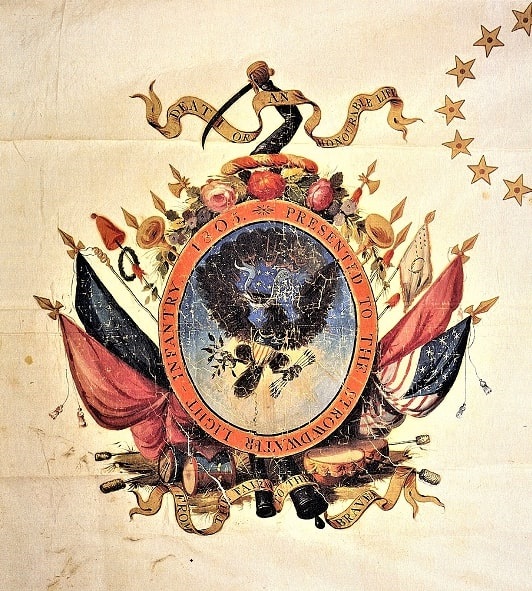
The banner is now housed at the Maine Historical Society. On the obverse, a soaring eagle with a shield, clutching arrows and an olive branch, is inscribed “Presented to the Stroudwater Light Infantry / From the Fair to the Brave.”
Above is the legend: “Death, or an honorable life.”
On the reverse is a Native American enclosed by the motto: “Ense Petit Placidam Sub Libertate Quietem” (translated from the Latin as “By the sword we seek peace, but peace only under liberty”).
In 1880 the banner was on exhibit at the Daniel Broad Tavern in Stroudwater. Broad was ensign at the time.
Many relics were on display from the family, so stay tuned for more!
Explore over 330 years of newspapers and historical records in GenealogyBank. Discover your family story! Start a 7-Day Free Trial
Note on the header image: Stroudwater Light Infantry Company banner, 1805, reverse. Painted silk. Courtesy of the Maine Historical Society, Portland, Cumberland County, Maine.
Related Articles:
- More on Joseph Quimby at Genealogical History of the Quinby (Quimby) Family in England and America 99-105
- Paternity Court Drama in 17th Century America
- Paternity Court Drama in 17th Century America, Part II
- Paternity Court Drama in 17th Century America, Part III
- Genealogy Discoveries: Lost Babes of Essex County, MA
- Famous Hotchkiss Family Line Descended from 17th Century ‘Filthy Dalliance’
- Puritan Court Drama: Woman Won’t Identify Child’s Father
- Puritan Court Drama: Woman Won’t Identify Child’s Father, Part II
- Paternity Drama in Colonial America (part 1)
